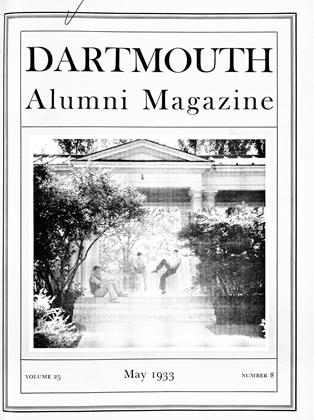A CERTAIN type of politician has often found some popular approval in stamping as "academic" and therefore useless, certain policies enunciated by his rival or competitor for public office. Indeed the term "academic" has in itself through much repetition come to have a certain shade of disfavor in the field of practical politics. However professional participation is nothing new. Members of college faculties, administrative officers, in some rare cases students, have from time immemorial taken an active part in local and national politics, and the present national administration with its Professor Raymond Moley and the "brains trust" only emphasizes the important roles which these men have played in politics. Many years ago at a German election it was found that no less than 88 professors had been elected to a governing German political body, at which the poet exclaimed: "Acht und achtzig ProfessorenVaterland, du bist verloren."
"Eighty-eight professors. Fatherland thou art lost."
And yet the college president and professor continue to take an active part in the political life of the country, to express themselves upon public issues and to run for office. And their opinions are usually received with the greatest of interest and seriousness.
It leads one to the conclusion that politics offers to the thinking man one of the greatest fields in which to exercise his talents, or perhaps his genius. The relation of politics to education is by no means remote. Interchanges of professors with diplomats and diplomats with professors have been quite notable not only in America but in foreign countries for many years. Diplomatic posts abroad have been filled many times by men of cultural and academic tastes, coming often from the faculty of the college or university or from the shadow of its influence. Woodrow Wilson went from the presidency of Princeton to the governorship of New Jersey and later to the presidency. William Howard Taft went from the presidency to Yale University. Henry Cabot Lodge went from the faculty of Harvard to active political life and his book "The Scholar in Politics" was once much read. Thomas Jefferson's relations with the University of Virginia form a chapter in American collegiate history. Seth Low, Nicholas Murray Butler, Dallas Lore Sharp, Francis B. Sayre, Edwin Walter Kemmerer and Charles Francis Adams have furnished examples of the ability of men in the educational field to transfer that activity to national political life. President Hopkins' association with the Wilson cabinet, with prominent Washingtonians since the War, and his expressed ideas on public questions, have emphasized the relationship between educators and politics.
The curious paradox of it all is that while the professional politicians have sneered a bit at the term academic' the public has expressed its approval of the college and university type on many occasions. The example of President Roosevelt openly commending and using the service of college officers and professors gives strength to that approval.
 View Full Issue
View Full Issue
More From This Issue
-
 Article
ArticleHANOVER BROWSING
May 1933 By Rees Higgs Bowen -
 Class Notes
Class NotesClass of 1910
May 1933 By Harold P. Hinman -
 Class Notes
Class NotesClass of 1929
May 1933 By Frederick William Andres -
 Class Notes
Class NotesClass of 1902
May 1933 By Hermon W. Farwell -
 Article
ArticleDARTMOUTH'S WATCH ON THE RHINE
May 1933 By Gail M. Raphael '34 -
 Class Notes
Class NotesClass of 1932
May 1933 By Charles H. Owsley







